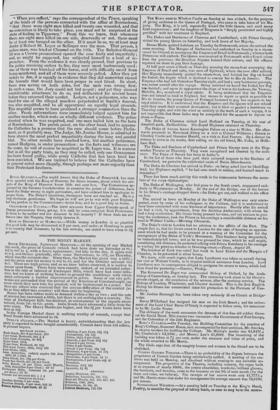"When you reflect," says the correspondent of the Times, speaking
of the trials of the persons connected with the affair at Bonisokane, "that there were eight men killed and twenty-one wounded, and that no conviction is likely to take place, you must not be surprised at the state of feeling in Tipperary." From this we learn, that whenever there are eight men killed on one side, deservedly or not, there must be at least one hanged on the other. If it must be so, we at least may doubt if Robert St. Leger or Sellinger was the man. That person, a police-man, was tried at Clonmel on the 19th. The Solicitor-General (it was a Crown prosecution) opened the case fairly and impartially; and, as might be supposed, has subjected himself to a load of re- proaches. From the evidence it was clearly proved, that previous to the police receiving orders to fire, they were most barbarously used : one of them was knocked off his horse, and with difficulty saved from being murdered, and all of them were severely pelted. After they got orders to fire, it is equally in evidence that they did somewhat exceed the bounds that would have been proper in cool blood. In short, there was wrong on both sides, but the mob was wrong first. In such a case, the Jury could not but acquit ; and yet they showed considerable reluctance to do so, and deliberated for several hours before they returned their verdict. Ledger, not a policeman, who was tried for one of the alleged murders perpetrated at Smith's funeral, was also acquitted, and to all appearance on equally legal grounds. This acquittal seems to have produced a stronger commotion than the other. Fresh informations were immediately lodged against him for another murder, which rests on wholly different evidence. The police shouted when he was acquitted, and one man hailed him as the hero of Bornsokane. The parish priest, on the other hand, had to appease the Catholics by a promise that the case should come before Parlia- ment, as it probably may. The Judge, Mr. Justice Moore, is admitted to have shown the most perfect impartiality during the long and painful trial. No other results have reached town, but another policeman, named Hodgens, is under prosecution : as the facts and witnesses are the same, he will of course be acquitted as St. Leger was. It is curious that in all the party trials, as they may he called, only one Orangeman has been found guilty, while every Catholic that has been tried has been convicted. We are inclined to believe that the Catholics have in general acted more illegally, though perhaps not more unjustly than their Protestant brethren.


















 Previous page
Previous page